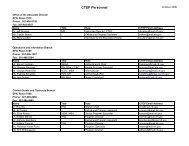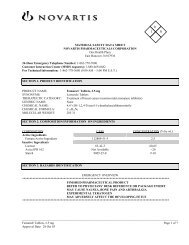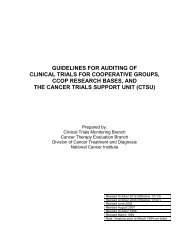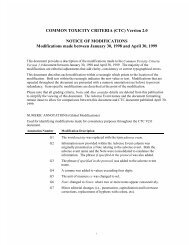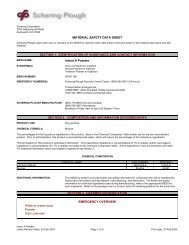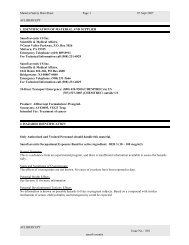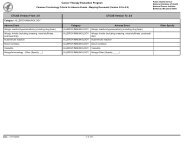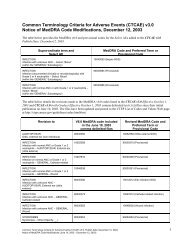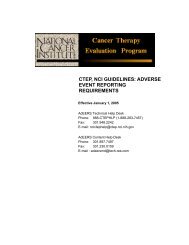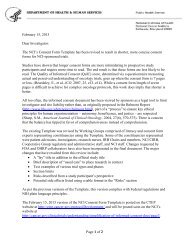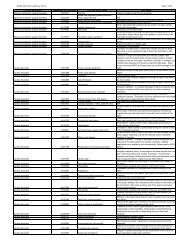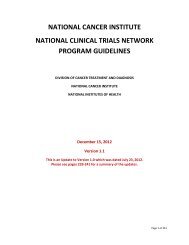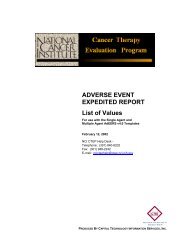ECOG E2100 - Cancer Therapy Evaluation Program (CTEP)
ECOG E2100 - Cancer Therapy Evaluation Program (CTEP)
ECOG E2100 - Cancer Therapy Evaluation Program (CTEP)
Create successful ePaper yourself
Turn your PDF publications into a flip-book with our unique Google optimized e-Paper software.
<strong>ECOG</strong> Pharmacogenomics:<br />
Anti-Angiogenic Agents<br />
Bryan P. Schneider, MD<br />
George Sledge MD, Kathy Miller MD, David Flockhart MD, PhD,<br />
Todd Skaar PhD, Sunil Badve PhD.<br />
COBRA, Indiana University
Hallmarks of malignancy: a<br />
biomarker rich environment?<br />
Tumor Specific<br />
Host-specific<br />
THE HOST target:<br />
high yield for host-imprinted<br />
genetic variability<br />
Cell, Vol. 2, Hanahan D, Weinberg RA, The Hallmarks of <strong>Cancer</strong>, 57-70, 2000
Genetic variability impacts<br />
angiogenesis: brief summary<br />
• Epidemiologic data:<br />
– Variable risk & prognosis in multiple conditions were<br />
angiogenesis is important: risk/prognosis in multiple<br />
malignancies, retinopathy, nephropathy, pre-eclampsia,<br />
recurrent pregnancy loss, vasculopathy<br />
– Mostly VEGF, HIF1a, & NOS<br />
NOT Level 1 evidence<br />
Body – Limitations: of data: strongly Conflicting suggests data, single variability gene/SNP is approach, biologically & important<br />
clinical variables often ignored<br />
• Variability may associate with site of metastasis<br />
– VEGF -1498 CC more common in visceral (vs. bone) mets<br />
• VEGFR-1 promoter SNP associated with<br />
Breast cancer angiogenesis as a model<br />
differential induction by p53: (Menendez, PNAS 2006)<br />
• Variability in complement factor H may affect<br />
treatment outcome in macular degeneration<br />
(?biomarker)<br />
– CC genotype had inferior outcome in visual acuity with<br />
intravitreal bevacizumab<br />
Kim, Ann Oncol 2007; Park, Anticancer Res 2007; Chae, Oncology 2006; Hefler, Clin <strong>Cancer</strong> Res 2007; Garcia-Closas, PLoS Genet 2007; Tzanakis, J Surg Oncol 2006; Sfar, Cytokine 2006; Krippl,<br />
Int J <strong>Cancer</strong> 2003; Balasubramanian, Br J <strong>Cancer</strong> 2002; McCarron, <strong>Cancer</strong> Res 2002; Al-Kateb, Diabetes 2007; Errera, Diabetes Care 2007; Banyasz, Curr Eye Res 2006; Suganthalakshmi, Mol Vis<br />
2006; Ray, Diabetes 2004; Awata, Diabetes, 2002; McKnight, J Diabetes Complications 2007; Chow,Ren Fail 2006; Doi, J Am Soc Nephrol 2006; Summers, Nephrol Dial Transplant 2005; Shim, Am<br />
J Obstet Gynecol 2007; Banyasz, Mol Hum Reprod 2006; Papazoglou, Fertil Steril 2005; Petrovic, Cardiology 2007; Howell, J Med Genet 2005; Yang, J Diabetes Co mplications 2003
evacizumab<br />
Excellent genetic variability in<br />
IMC-1121B<br />
angiogenesis drug targets<br />
VEGF: multiple<br />
established SNPs in<br />
promoter, 55’UTR,<br />
UTR, &<br />
3’UTR UTR<br />
sunitinib<br />
sorafenib<br />
others…<br />
VEGFR VEGFR-2: 2: significant genetic variability<br />
with several frequent NS SNPs<br />
p85<br />
PLC PLCg<br />
Transcription<br />
factor inhibition<br />
ras<br />
GRB2 SOS
Bevacizumab in breast cancer-<strong>E2100</strong>:<br />
a model of therapeutic heterogeneity<br />
Stratify:<br />
• DFI < 24 mos. vs. > 24 mos.<br />
• < 3 vs. > 3 metastatic sites<br />
• Adjuvant chemotherapy yes vs. no<br />
• ER+ vs. ER- vs. ER unknown<br />
R<br />
A<br />
N<br />
D<br />
O<br />
M<br />
I<br />
Z<br />
E<br />
Paclitaxel + Bevacizumab<br />
722 randomized<br />
Paclitaxel<br />
666 evaluated for efficacy<br />
672 evaluated for toxicity
Bevacizumab increased grade 3/4 toxicity<br />
Serious but rare<br />
Serious, frequent, & unique<br />
Likely related to duration of taxane exposure<br />
Toxicity P (%) P+B (%) p-value<br />
Infection 2.9 9.3
PFS Proportion<br />
1.0<br />
0.8<br />
0.6<br />
0.4<br />
0.2<br />
0.0<br />
Bevacizumab significantly<br />
improved PFS<br />
Pac. + Bev. 11.8 months<br />
Paclitaxel 5.9 months<br />
HR = 0.60<br />
Log Rank Test p
Improvement in PFS/ORR did not<br />
Miller et al. NEJM 357:2666; 2007<br />
translate into OS benefit<br />
ORR<br />
(measurable disease)<br />
49.2% vs. 25.2%<br />
P
GOOD NEWS=all subgroups gained benefit<br />
We need something better!<br />
BAD NEWS= our common clinical variables<br />
were unable to identify an effect group<br />
Miller et al. NEJM 357:2666; 2007
Attempts to find surrogate markers<br />
for response to bevacizumab<br />
unsuccessful to date<br />
• Tumor VEGF, Thrombospondin-2, k-ras,<br />
k-raf, p53 & MVD did NOT correlate with<br />
survival for patients with metastatic colon<br />
cancer treated with bevacizumab<br />
• Baseline serum VCAM & urine VEGF did<br />
NOT correlate with outcome in <strong>E2100</strong><br />
Jubb et al., JCO, 24, 217-227; 2006<br />
Ince et al., J Natl <strong>Cancer</strong> Inst, 97:981-9, 2005<br />
Miller et al. SABCS, Abstract#3: 2005
Germline genetic variation in tumor<br />
angiogenesis<br />
• This an excellent place to study role of germline<br />
genetic variation!<br />
– Hallmark of malignancy<br />
– Other active drugs against angiogenesis<br />
– Balanced heterogeneity<br />
• Clear benefit vs. no benefit<br />
• Frequent, unique, non-overlapping toxicities<br />
– “Targeted therapy” without a population to target<br />
– Tumor angiogenesis is genetically diverse<br />
• Variation appears to been inherited (vs. mutations)
<strong>E2100</strong> Pharmacogenomics:<br />
a TBCI-catalyzed study<br />
• Evaluate for correlation between VEGF/VEGFR-<br />
2 SNPs (from primary tumor) & efficacy<br />
– PFS (primary endpoint)<br />
– Overall Survival<br />
– OR<br />
• Evaluate for correlation between VEGF/VEGFR-<br />
2 SNPs (from primary tumor) & toxicity<br />
– Clinically significant hypertension (Grade 3/4)<br />
• Evaluate for association between SNPs &<br />
expression (IHC)<br />
• Evaluate for association between expression<br />
(IHC) & outcomes
Candidate SNPs meet fundamental<br />
• Biologic rationale:<br />
requirements<br />
– Impact on breast ca risk/other<br />
– Reasonable likelihood will alter<br />
gene function and/or<br />
production<br />
• Genes are clear drug<br />
targets:<br />
– VEGF/VEGFR-2<br />
• High frequency of rare<br />
allele:<br />
– VEGF SNPs: 15-49%<br />
– VEGFR-2 SNPs: 9-25%<br />
Candidate SNPs:<br />
VEGF<br />
-2578 C/A, -1498 C/T,<br />
-1154 G/A, -634 G/C,<br />
& +936 C/T<br />
VEGFR-2<br />
V297I, & Q472H
<strong>E2100</strong> Pharmacogenomics:<br />
a TBCI-catalyzed study<br />
• Evaluate for correlation between VEGF/VEGFR-<br />
2 SNPs (from primary tumor) & efficacy<br />
– PFS (primary endpoint)<br />
– Overall Why Survival did we not use germline DNA?<br />
– OR<br />
• Evaluate for correlation between VEGF/VEGFR-<br />
2 SNPs (from primary tumor) & toxicity<br />
Can we assume polymorphic sites evaluated<br />
– Clinically significant are same hypertension in tumor and (Grade host?<br />
3/4)<br />
• Evaluate for association between SNPs &<br />
expression (IHC)<br />
• Evaluate for association between expression<br />
(IHC) & outcomes
Genetic variability in tumor angiogenesis is<br />
identical to germline DNA<br />
•Genotype- (21 women with breast cancer)<br />
-Primary breast tumor (n=17)<br />
-LN+ (n=17) & LN- (n=19)<br />
-VEGF 936 C/T<br />
-eNOS Promoter (-786 T/C) & Exon 7 E298D<br />
•All polymorphisms (combined sites)<br />
-high quality chromatographs in 145 of 159<br />
(91%)<br />
-100% concordance between samples that<br />
involved malignancy (primary or LN+) vs<br />
germline (95% CI, 0.88 to 1.00 )<br />
Schneider et al. Breast <strong>Cancer</strong> Research and Treatment. 96: 209; 2006
<strong>E2100</strong> correlative study:<br />
Methods<br />
• 673 eligible pts & 623 dz progression (11/07)<br />
• DNA extracted from paraffin embedded tumor<br />
blocks (genotype-363; VEGF IHC-377; VEGFR2-341)<br />
– ~50% from experimental arm<br />
• Genotyping of candidate SNPs (Real time-PCR)<br />
– VEGF: -2578 C/A, -1498 C/T, -1154 G/A, -634 G/C,<br />
936C/T<br />
– VEGFR-2: V297I & Q472H<br />
• IHC for VEGF & VEGFR-2 tumor expression
VEGF -2578 AA & -1154 AA genotypes<br />
associated with improved OS in<br />
SNP Genotype comparison<br />
(median OS in mo & freq)<br />
combination arm<br />
HR CI Pvalue<br />
VEGF-2578 CA (24.4; 42.6%) vs. AA (37.0; 20.8%) 1.78 (98.3%=0.96, 3.32) 0.026<br />
CC (22.2; 37.6%) vs. AA (37.0; 21%) 1.70 (98.3%=0.91, 3.17) 0.043<br />
CC (22.2; 37.6%) vs. CA (24.4; 42.6%) 0.99 (98.3=0.62, 1.58) 0.95<br />
AA vs. CA+CC 0.58 (95%-0.36, 0.93) 0.023<br />
VEGF-1154 GG (22.3; 56.9%) vs. GA (29.8; 38.8%) 1.60 (98.3%=0.98, 2.60) 0.022<br />
GG (22.3; 56.95) vs. AA (46.5; 9.4%) 2.69 (98.3%=1.10, 6.59) 0.008<br />
GA (29.8; 38.8%) vs. AA (46.5; 9.4%) 1.68 (98.3%=0.66, 4.30) 0.19<br />
AA vs. GA vs. GG 0.62 (95%=0.46, 0.83) 0.001<br />
Schneider et al; SABCS, 2007
VEGF -2578 AA & -1154 AA<br />
genotypes in combination arm<br />
Median OS<br />
Control arm=25.2 mo<br />
Combination arm=26.7 mo<br />
Combination arm AA=37.0 mo<br />
outperformed control<br />
p=0.035 46.5 mo<br />
25.2 mo<br />
25.2 mo<br />
37.0 mo<br />
Median OS<br />
Control arm=25.2 mo<br />
Combination arm=26.7 mo<br />
Combination arm AA=46.5 mo<br />
p=0.047
Genetic variability of VEGF predicts<br />
clinically significant hypertension in<br />
<strong>E2100</strong><br />
SNP % Grade 3/4 hypertension<br />
(#/%) by genotype<br />
VEGF-634 CC=0% (n=27;15.3%) vs.<br />
GC=22% (n=82; 46.3%) vs.<br />
GG=19% (n=68; 38.4%)<br />
p-value<br />
0.013<br />
CC vs. GC+GG 0.005<br />
VEGF-1498 TT=8% (n=60; 33.9%) vs.<br />
CT=22% (n=82; 46.3%) vs.<br />
CC=23% (n=35; 19.8%)<br />
0.056<br />
TT vs. CC+CT 0.022<br />
Schneider et al; SABCS, 2007
The Promise of Pharmacogenetic<br />
HER2-, metastatic<br />
breast cancer<br />
Walgren et al. JCO 2005<br />
Testing<br />
VEGF -2578 CA, CC<br />
VEGF -1154 GA, GG<br />
VEGF -634 CC<br />
VEGF -1498TT<br />
VEGF -2578 CA, CC<br />
VEGF -1154 GA, GG<br />
VEGF -634 GC, GG<br />
VEGF -1498 CT, CC<br />
VEGF -2578 AA<br />
VEGF -1154 AA<br />
VEGF -634 GC, GG<br />
VEGF -1498 CT, CC<br />
VEGF -2578 AA<br />
VEGF -1154 AA<br />
VEGF -634 CC<br />
VEGF -1498 TT
VEGF genotypes may be<br />
associated with tumor expression<br />
• VEGF genotype trended toward a<br />
correlation with VEGF expression<br />
– Prior preclinical data suggest VEGF<br />
-2578A & -1154A alleles have lower<br />
expression<br />
– VEGF-2578 AA genotype had lower<br />
VEGF expression (p=0.12) vs. alternate<br />
genotypes<br />
– VEGF-1154 AA genotype had lower<br />
VEGF expression (p=0.08) vs. alternate<br />
genotypes<br />
– Does this provide some sort of<br />
mechanistic clue??<br />
• Host-mediated changes in plasma VEGF<br />
after angiogenesis therapy-(Ebos, Kerbel<br />
PNAS 2007)<br />
• VEGF & VEGFR-2 expression did not<br />
correlate with outcome in <strong>E2100</strong>
What are the mechanistic<br />
explanations for our clinical<br />
findings??<br />
• Background/Rationale<br />
– Data suggest there is a role for variability in outcome<br />
BUT:<br />
– SNPs & haplotypes not fully defined (PGRN/NHLBI<br />
Sequencing in Process)<br />
– Prior pre-clinical promoter studies are incomplete<br />
• Plan<br />
– Re-sequence promoter & 5’-UTR<br />
– Definitively establish genetic variation & haplotypes<br />
– Evaluate role of SNPs on promoter activity
VEGF Promoter & 5’-UTR Re-sequencing<br />
• 4.0kb upstream of “ATG” start codon<br />
– 96 samples from Coriell Repository<br />
• 48 Caucasians, 48 African Americans<br />
– Captures all known transcription factor binding sites<br />
– Contains a high density of SNPs<br />
• Identified 19 SNPs<br />
– 16 of 19 SNPs previously reported (NCBI)<br />
• 13 common & 3 rare (
Caucasians African-Americans
Caucasians African-Americans<br />
76% 70%<br />
47%
Conclusions<br />
• Pharmacogenetics (biomarkers)<br />
– Improves therapeutic index<br />
– Leads to drug discovery<br />
– Benefits patients<br />
• Angiogenesis<br />
– Hallmark of malignancy<br />
– Inhibition effective in multiple tumor types<br />
– Therapeutic heterogeneitybiomarkers<br />
needed<br />
• Early work suggests germline genetic<br />
variability might be important<br />
• Validation and further understanding of<br />
molecular biology essential<br />
“Host Hallmark”
Acknowledgements<br />
• David Flockhart MD, PhD<br />
• Milan Radovich<br />
• Bradley Hancock<br />
• Jason Robarge<br />
• Lang Li, PhD<br />
• Faouzi Azzouz,<br />
• Suzanne Lemler, RN<br />
• Todd Skaar, PhD<br />
• Anne Nguyen<br />
• Sunil Badve, MD<br />
• George Sledge, MD<br />
• Kathy Miller, MD<br />
• Anna Maria Storniolo, MD<br />
• Connie Rufenbarger<br />
• “Friends for Life Coalition”<br />
Supported by: ASCO Career Development Award, BCRF, GCRC CreFF<br />
Award, Catherine Peachey Fund, & IU Simon <strong>Cancer</strong> Center
Low baseline<br />
VEGF<br />
high baseline<br />
VEGF<br />
“VEGF low” expressers (-2578AA, -1154AA)<br />
Time<br />
Start bev Stop bev<br />
gradual re-institution of<br />
tumor angiogenesis<br />
“VEGF high” expressers (alternate genotypes)<br />
Hypertension<br />
threshold<br />
Start bev Time<br />
Rebound increase<br />
in angiogenesis:<br />
“Kerbel model”<br />
Stop bev<br />
Hypertension<br />
threshold<br />
prolonged<br />
angiogenesis<br />
blockade<br />
?<br />
never<br />
expose to<br />
angiogenesis<br />
tx



